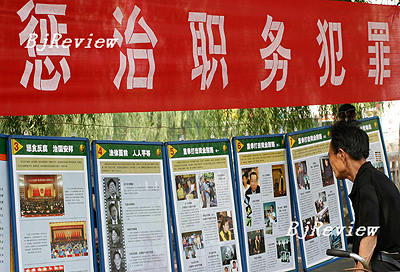
Uniformity May Be Ugly
Many cities across China are trying to make their cities orderly in appearance: In Lanzhou, capital of Gansu Province in northwest China, all cold drink stalls must use the same kind of refrigerators; in Ledong County, south China's Hainan Province, all sun umbrellas must be the same; now in some streets of Beijing's Xicheng District, shops are required to put up the same kind of signboards.
Why are local authorities so passionate about the uniformity of streets? The big profits that these standardized products will bring via bulk sales may be a big reason, but more importantly, some officials seem to act too arbitrarily, imposing what they believe to be good for the whole society.
Officials must learn to believe in and respect people's aesthetic sense and grant them full right of choice. Take shop signboards for example, no shopkeeper will deliberately make his one more ugly than others'.
Strict rules and standardized products may build an orderly city, but it's quite doubtful that this will be a beautiful city. Thus, it's better to respect the public's imagination and creativity and allow them to decorate the city through the use of their own wisdom.
The Beijing News
Unpopular Legal Services
In late June, when procurators participating in a nationwide campaign went to the streets and communities to offer free legal consultation and receive public complaints, they got the cold shoulder. More officials and journalists turned up to these activities than ordinary citizens.
Does the public have nothing to complain about or report? Of course not. In recent years, the numerous cases of people appealing to higher authorities for help have attracted the attention of government at various levels. Among the public's complaints, most are about officials' corrupt conduct, embezzlement of public funds and power abuse. But the current situation is that: While so many people can find nowhere to submit their complaints, procurators offering public service outside sit idle.
It's improper to blame people's indifference to procurators on their limited legal knowledge. It is necessary for procuratorial organs to ask themselves: Do we deal carefully with the public's complaints?
The judicial and procuratorial departments are accountable for taking the public's complaints seriously and publicity drives should never be used as an opportunity for window dressing.
People's Daily
Migrant Children's Rights
Recently, the Beijing Municipal Bureau of Labor and Social Security released detailed regulations on health care for serious diseases. It is mentioned that students from outside Beijing can also take part in the government-sponsored health care system of their own free will. However, it has emerged that the so-called "free will" concession actually has rigid restrictions. For example, students who are eligible to participate of their own choice must be children of military officers, post-doctoral researchers and government-recognized high-caliber professionals.
Why are there so many restrictions when it comes to health care? Among the children who are excluded from the health care system, some have parents who build roads or houses for the city. It is their hard work that is making Beijing a developed and convenient metropolis.
To decide the qualification for health care in accordance with parents' professions is quite unfair. By doing so, Beijing seems to lack the necessary care a big city should have for its residents, who make the city what it is.
The Beijing News
Watch Officials' Spending at Olympic Time
It is predicted that during the 2008 Olympic Games, Beijing's hotels will raise prices by up to 10 times. Correspondingly, various expenses will rise. Therefore, some are worried that too high expenses may prevent people from entering Beijing, saying that during the 2004 Athens Olympics, because of the high expenses, the hotel room occupancy rate in the host city was lower than expected.
Nevertheless, in China, these seem to be "unnecessary" worries, because the country now has large groups of people who can afford to travel. Many of them, mostly officials, were even capable of going to Athens for the Olympics, and as the next games will be held in their own country, why should they give up this good opportunity? With the support of public money, even if the prices rise 20 or 30 times, they are certain to come.
Officials' casual spending of public money is deeply loathed by the public. Given the above worries about luxury and corruption during the 2008 Olympic Games and with the nearing of the sport gala, it's necessary for relevant government departments to take precautionary measures to prevent local officials from splurging. Otherwise, the 2008 Olympic Games will be just another opportunity for excessive luxury and corruption.
China Youth Daily | 